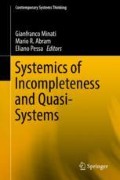Abstract
In the early eighties of the last century three theories were independently developed in the fields of information science, mathematical psychology and cognitive psychology. In 1982 Rudolph Wille conceptualized a principled way of deriving a concept hierarchy from a collection of objects and their properties: the Formal Concept Analysis. Such representation draws upon the order theory developed in 1937 by Birkhoff about the one-to-one correspondence between distributive lattices and partial orders. In 1985 Jean Claude Falmagne and Jean-Paul Doignon, starting from Birkhoff’s theorem, developed a theory to represent the prerequisite relations among sets of problems in the field of knowledge assessment: The Knowledge Space Theory. In 1983 Kikumi Tatsuoka introduced the concept of a Q-Matrix defining the basis for the development of a skill based way for cognitive diagnosis: The Cognitive Diagnostic Models. It is an interesting issue how, so far, only few attempts to highlight similarities among these theories have been carried out. This research is aimed at pinpointing some of the main deterministic and probabilistic concepts that, even if named differently, are shared by the three theories.
Access this chapter
Tax calculation will be finalised at checkout
Purchases are for personal use only
References
Birkhoff, G. (1937). Rings of sets. Duke Mathematical Journal, 3, 443–454.
Birkhoff, G. (1967). Lattice theory. Providence: American Mathematical Society Colloquium Publication (No. XXV).
Doignon, J.-P., & Falmagne, J. C. (1985). Spaces for the assessment of knowledge. International Journal of Man-Machine Studies, 23, 175–196.
Doignon, J.-P., & Falmagne, J. C. (1999). Knowledge spaces. Berlin: Springer.
Falmagne, J. C., & Doignon, J.-P. (1988). A class of stochastic procedures for the assessment of knowledge. British Journal of Mathematical and Statistical Psychology, 41, 1–23.
Falmagne, J. C., & Doignon, J.-P. (2011). Learning spaces. Berlin: Springer.
Ganter, B., & Wille, R. (1999). Formal concept analysis: Mathematical foundations. Berlin: Springer.
Haertel, E. H. (1984). An application of latent class models to assessment data. Applied Psychological Measurement, 8, 333–346.
Haertel, E. H. (1989). Using restricted latent class models to map skill structure of achievement items. Journal of Educational Measurement, 26, 301–321.
Heller, J., Stefanutti, L., Anselmi, P., & Robusto, E. (2015). On the link between cognitive diagnostic models and knowledge space theory. Psychometrika, 80, 995–1019.
Lazarsfeld, P. F., & Neil, W. H. (1968). Latent class structures. Boston: Houghton Mifflin.
Lukas, J., & Albert, D. (1993). Knowledge assessment based on skill assignments and psychological task analysis. In G. Strube & K. F. Wender (Eds.), The cognitive psychology of knowledge (pp. 139–150). Amsterdam: Elsevier.
Roussos, L. A., Templin, J. L., & Henson, R. A. (2007). Skills diagnosis using IRT-based latent class models. Journal of Educational Measurement, 44, 293–311.
Rusch, A., & Wille, R. (1996). Knowledge spaces and formal concept analysis. In H. H. Bock & W. Polasek (Ed.), Data analysis and information systems. Statistical and conceptual approaches (pp. 427–436). Berlin: Springer.
Spoto, A., Stefanutti, L., & Vidotto, G. (2010). Knowledge space theory, formal concept analysis and computerized psychological assessment. Behavior Research Methods, 42, 342–350.
Spoto, A., Stefanutti, L., & Vidotto, G. (2013). Considerations about the identification of forward- and backward-graded knowledge structures. Journal of Mathematical Psychology, 57, 249–254.
Stefanutti, L., Spoto, A., & Vidotto, G. (2018). Detecting and explaining BLIM’s unidentifiability: Forward and backward parameter transformation groups. Journal of Mathematical Psychology, 82, 38–51.
Tatsuoka, C. (2009). Diagnostic models as partially ordered sets. Measurement, 7, 49–53.
Tatsuoka, K. K. (1985). A probabilistic model for diagnosis misconceptions by the pattern classification approach. Journal of Educational Statistics, 10(1), 55–73.
Tatsuoka, K. K. (1990). Toward an integration of item-response theory and cognitive error diagnosis. In N. Frederiksen, R. Glaser, A. Lesgold, & M. G. Safto (Eds.), Diagnostic monitoring of skill and knowledge acquisition (pp. 453–488). Hillsdale: Lawrence Erlbaum Associates.
Wille, R. (1982). Restructuring lattice theory: An approach based on hierarchies of concepts. In I. Rival (Ed.), Ordered sets (pp. 226–233). New York: Springer.
Author information
Authors and Affiliations
Corresponding author
Editor information
Editors and Affiliations
Rights and permissions
Copyright information
© 2019 Springer Nature Switzerland AG
About this chapter
Cite this chapter
Nicotra, E.F., Spoto, A. (2019). Connections and Dissimilarities Among Formal Concept Analysis, Knowledge Space Theory and Cognitive Diagnostic Models in a Systemic Perspective. In: Minati, G., Abram, M., Pessa, E. (eds) Systemics of Incompleteness and Quasi-Systems. Contemporary Systems Thinking. Springer, Cham. https://doi.org/10.1007/978-3-030-15277-2_17
Download citation
DOI: https://doi.org/10.1007/978-3-030-15277-2_17
Published:
Publisher Name: Springer, Cham
Print ISBN: 978-3-030-15276-5
Online ISBN: 978-3-030-15277-2
eBook Packages: Mathematics and StatisticsMathematics and Statistics (R0)

